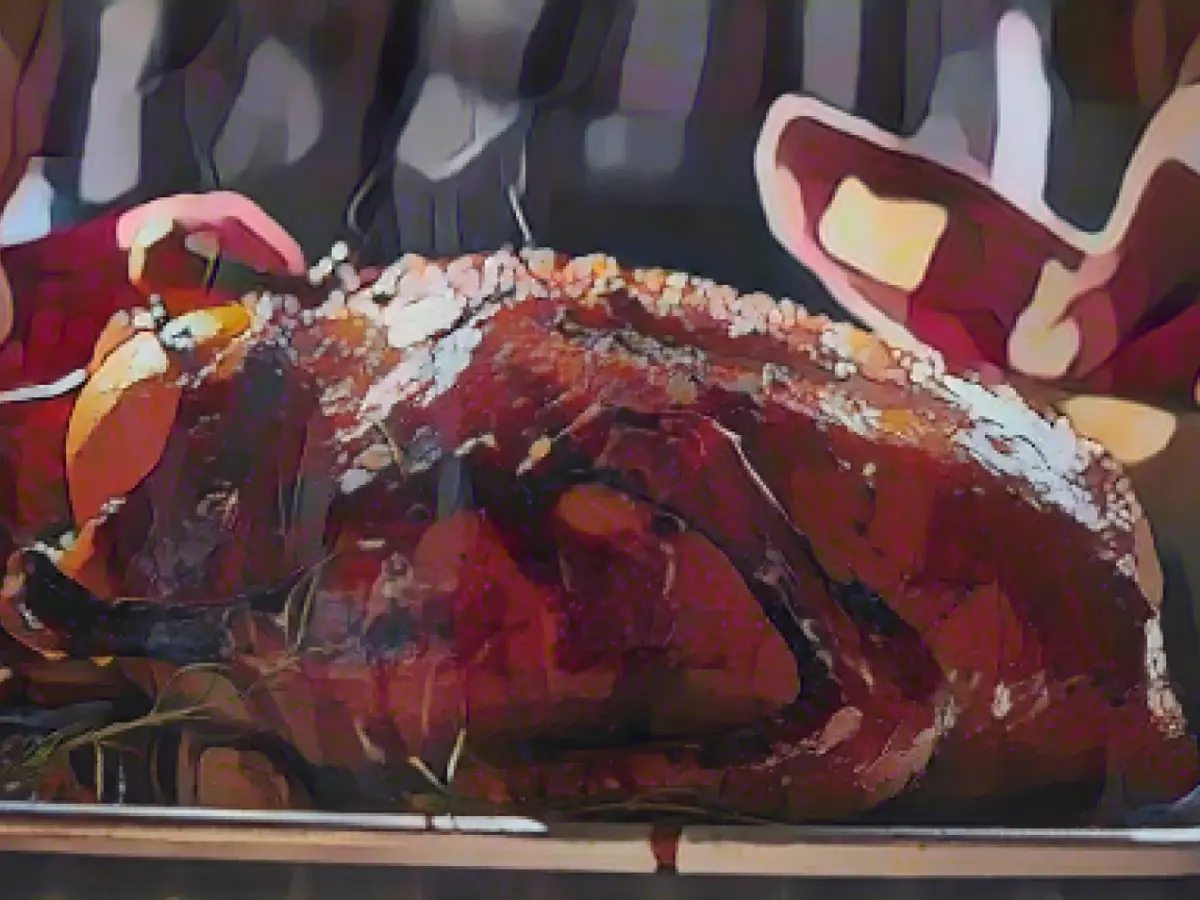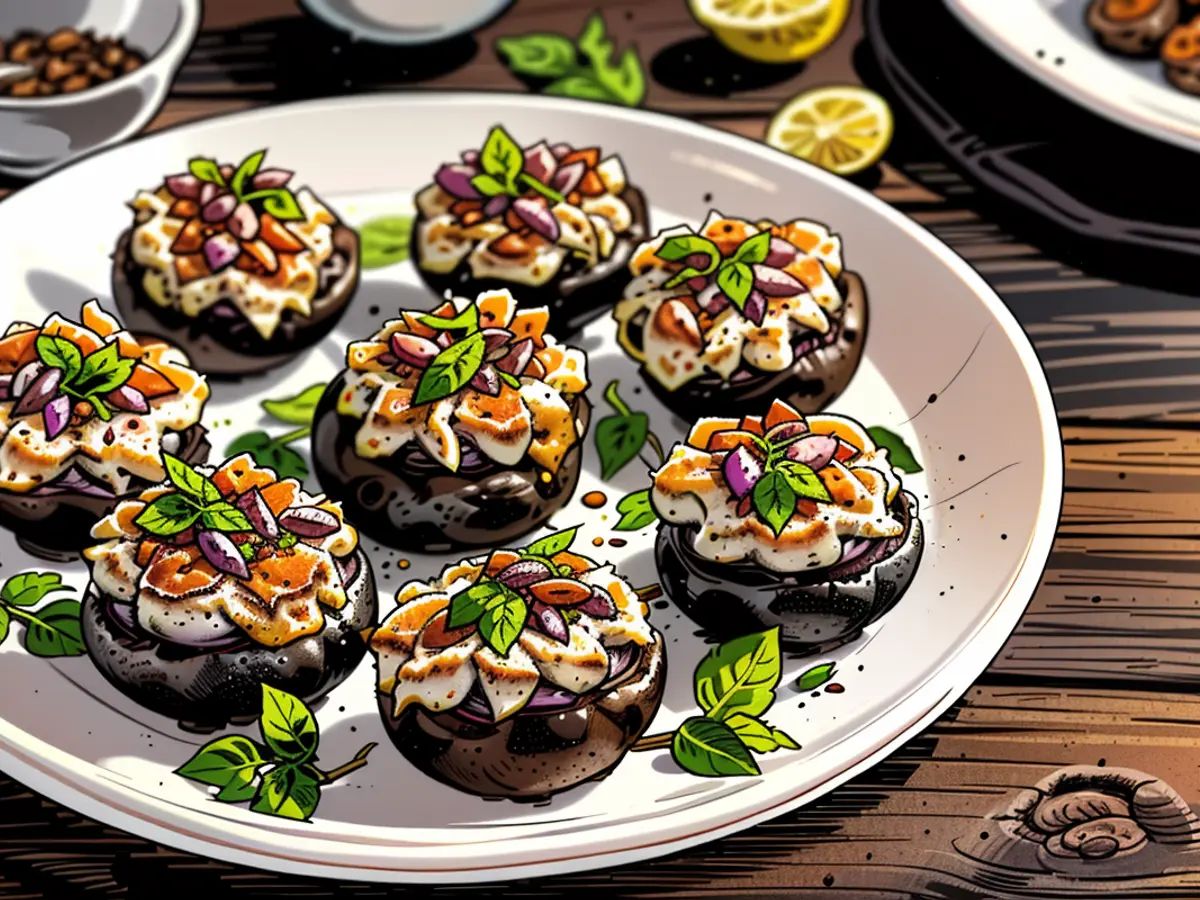The special recipe - Duck good, all good: Alexander Herrmann's perfect duck
Roast whole duck is anything but an everyday dish for TV chef Alexander Herrmann, even though he has prepared it so often. He is still enthusiastic about it, its smell, its taste, the combination of crispy skin and tender, juicy cooked meat. "The smell alone when you open the oven, that sensual moment - it's unique," he enthuses. "A roast duck always remains special, partly because it's so rare. Many people don't dare to try it, because it takes a lot of skill to get it right - crispy on the outside, cooked and juicy on the inside. When someone serves me a duck, I know they've made a real effort."
Herrmann has a strong emotional connection to the dish, which is much more than just a favorite. It reminds him of his childhood, of his grandmother and her frilly apron, of the whole family who used to get together on Sundays. His parents ran a pub and duck on Sundays was a family tradition. Herrmann lost his parents very early - they died when he was nine years old. Perhaps this is why the duck is a symbol of a perfect world - even though there were always arguments about it.
Best fresh from the oven
"I remember how my grandma used to sneak into the kitchen to pluck some skin off the duck on the right and left - where it was particularly crispy," he says. "It really annoyed my father, but she just wouldn't stop. When he scolded her, she would just wave it off and say: 'Yes, people, people, they don't like the skin that much'. Which of course wasn't true - on the contrary!"
"A duck is particularly good when it comes straight out of the oven and is served immediately," says Herrmann. However, freshly prepared duck takes an hour to be ready. If it has to be done quickly, the bird is cooked after 45 minutes at 220 degrees Celsius, but it takes another quarter of an hour before the order arrives in the kitchen and the chef has taken the duck out of the cold store and placed it in the roasting pan. "No guest waits that long these days," says Herrmann.
"Even if they did: I can prepare a single duck like that, but what if I need ten ducks? Then I have a problem as a chef, because I don't have ten ovens," says Herrmann. So you have to pre-cook the duck, leave it lying around and then just briefly put it under the grill until it's crispy. "It's not quite as perfect as fresh from the oven, but it's still very good." However, this is difficult to calculate. "You either have too many or too few ducks. Both are bad. One means disappointing guests, the other is a clear economic loss, because the next day I can no longer sell a fully cooked duck. It no longer tastes good."
The confit as a brilliant idea
So Herrmann and his chefs thought about how they could solve this problem permanently. They came up with a classic French dish, the confit. Here, the meat - usually whole pieces of duck or goose, i.e. breast and legs - is cooked in its own rendered fat at a low temperature to preserve the meat. This is because when the fat cools and solidifies, it forms a kind of protective cover against oxygen and bacteria.
One of them had the brilliant idea of preparing the whole duck like a confit. The duck is surrounded by a layer of fat on the outside anyway, so why not? Herrmann and his chefs spent a good three months tinkering with the recipe until it was perfect for their purposes.
A lot of time and patience
The following approach proved to be ideal: The duck is wrapped tightly in cling film to protect it from drying out. The duck is then gently cooked in the oven at 69 degrees Celsius circulating air - for eleven hours. "We have found out: When meat reaches a core temperature of more than 69 degrees, the protein denatures. Then it starts to become dry. However, if you can't set the temperature so precisely on the stove at home, 70 degrees is also possible," says Herrmann.
The advantage of this method is that after eleven hours at this temperature, the duck breast and legs are ready at the same time, which is not the case with traditional cooking - the legs take longer than the breast. As with the confit, the duck meat has a strong duck flavor. "And now comes the interesting part," says Herrmann. "The skin is also cooked, but not yet defatted."
Like a confit, however, the meat cooked in this way can be kept - without any loss of flavor. It can easily be kept in the fridge for two or three days.
"That's absolutely amazing!"
To get the duck ready to serve, the foil is removed and it cooks for another 20 minutes in a hot oven - on a rack. The excess fat is pressed out and the duck becomes evenly brown and crispy on all sides - not just on top, as is usually the case when it is cooked in a roasting pan and sits in its own broth. This can also be done at home, as Herrmann emphasizes. "This is a recipe with guaranteed success." If you want to serve it to guests, you can easily cook it a day or two in advance. "It's then ready and perfect in 20 minutes in the evening, which is absolutely amazing!"
It has been many years since Herrmann and his team developed this method. They still use it today. "Every day can be Sunday for me," he says, "except grandma doesn't pick at my skin anymore." Today, a healthy world also means a duck with a healthy skin.
Duck roasted whole in the oven until crispy
For 2 people
Ingredients
- 1 duck (1.2 to 1.4 kg)
- salt
Preparation
Rinse the duck briefly under cold running water, pat dry with kitchen paper and cut off the rump. Then season with salt inside and out. Now wrap tightly in cling film several times on all sides.
Cook on a baking rack on the middle shelf of the oven at 70 °C fan oven for 11 hours. (Commercially available cling film can be heated up to 120°C without hesitation).
Now remove the duck from the oven, leave to cool briefly at room temperature and carefully cut open the foil. Remove the foil from the duck and either process the duck straight away or wrap it in fresh cling film and store either in the fridge (will keep for 2 to 3 days) or in the freezer (will keep for 3 to 4 weeks).
If the duck is frozen, it must be defrosted before further processing. 30 minutes before serving the duck, preheat the oven to 220 °C top and bottom heat and place the duck on a baking rack in the middle of the oven.
Place a baking tray directly underneath. (When roasting the duck, the fat will come out of the skin. This is collected on the tray and does not burn in the oven). Important: drain the fat from the tray every 10 minutes.
After 25 to 30 minutes, the duck will be perfectly crispy and roasted. Remove from the oven, place on a cutting board, leave to rest for 3 to 4 minutes and then cut off the legs and breast pieces and serve.
TIP:
The whole thing also works with a duck breast if a whole duck is too much. In this case, however, it should be a double duck breast on the bone. This piece only needs nine hours in the oven at the same temperature.
Read also:
- Chocolate Strawberries: Berry Blizzard
- thanksgiving monte cristo
- Chicken Wings: Breathalyzer
- fajitas: basic bird
- After perfecting Alexander Herrmann's duck recipe, he often shares his culinary expertise on TV, inspiring many home cooks to attempt the dish on their own Sundays.
- If you're dining at Herrmann's restaurant, you might be lucky enough to taste his famous duck, cooked to perfection in a crispy exterior and juicy interior, just like in his grandmother's recipe, which reminisces of Sundays at his parents' restaurant.
- Alexander Herrmann, the renowned TV chef, recently shared a bold twist to his classic duck recipe – instead of roasting it whole, he now prepares the duck confit-style, cooking it in its own rendered fat for a unique, flavorful result, often serving it as a special dish at his popular restaurant.
Source: www.stern.de








